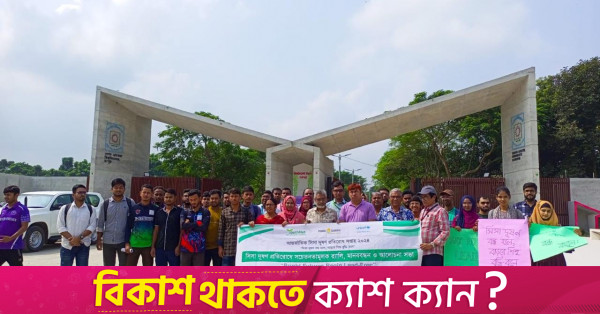Organised by YouthNet Global, Pure Earth Bangladesh, and UNICEF, the rally coincided with the observance of “International Lead Pollution Prevention Week” from 20-26 October. Photo: TBS
“>

Organised by YouthNet Global, Pure Earth Bangladesh, and UNICEF, the rally coincided with the observance of “International Lead Pollution Prevention Week” from 20-26 October. Photo: TBS
Speakers at a rally in front of the Begum Rokeya University in Rangpur today urged the government and policymakers to address lead pollution in Bangladesh.
Organised by YouthNet Global, Pure Earth Bangladesh, and UNICEF, the rally coincided with the observance of “International Lead Pollution Prevention Week” from 20-26 October.
The event, themed “Bright Futures Begin Lead-Free,” was attended by about 50 participants, including volunteers, local NGOs, government officials, environmental rights activists, and members of civil society.
Participants carried banners and placards with anti-lead pollution messages, chanting slogans like “Together, we can solve lead pollution.”
The initiative aimed to raise awareness and call for government action to implement stringent measures to prevent lead poisoning. Leaflets and stickers about lead pollution were distributed to the public during the event.
During the rally, speakers highlighted five key demands, including implementation of strict monitoring to ensure safe standards in consumer products, especially aluminium cookware, wall paint, and children’s toys.
Additionally, they urged the establishment of safe and formal lead-acid battery recycling systems, as well as preventing unsafe battery factories from operating nationwide.
Participants emphasised monitoring systems to identify and clean lead-contaminated areas caused by illegal recycling practices.
They also stressed reviewing and updating existing laws and policies on lead pollution to ensure effective enforcement.
The speakers also advocated for raising national awareness about the sources and dangers of lead pollution, calling for the involvement of all relevant stakeholders.
Monjur Ahmed, Social and Behavioral Change (SBC) officer at UNICEF, emphasised youth engagement in combating lead pollution.
“Last year, UNICEF developed guidelines to prevent lead pollution and has been working closely with organisations like Pure Earth to bring about sustainable changes. The potential change agents are the youth, and it is crucial to engage them in addressing this public health concern,” he said.
Dr Mahfuzur Rahman, country director of Pure Earth Bangladesh, also underscored the vital role of young people in this initiative.
“The youth are the architects of tomorrow’s world. Their active involvement in preventing lead pollution will lead to sustainable and constructive changes in their communities, ensuring a lead-free and safe environment for future generations,” he said.
Sohanur Rahman, executive coordinator of YouthNet Global, called for immediate action against lead pollution.
“As we confront the silent threat of lead pollution, we are fighting for the health and future of our children and our planet. The time for awareness and action is now. We young people are standing together, raising our voices, and demanding a lead-free Bangladesh,” he said.
The “International Lead Pollution Prevention Week” is observed globally every October to highlight the dangers of lead pollution. This year, the United Nations’ World Health Organization (WHO) urges governments, civil society, healthcare workers, and the public to take urgent action to protect children from the harmful effects of lead exposure.


